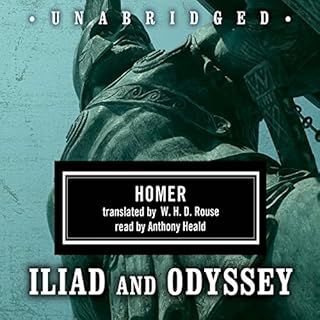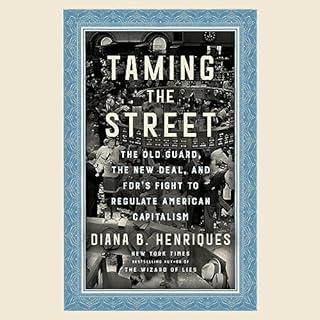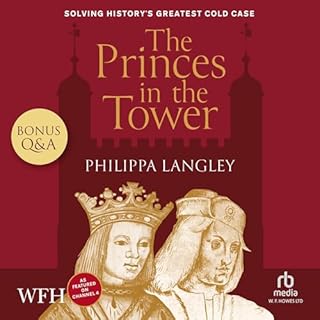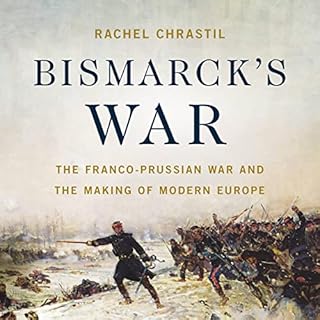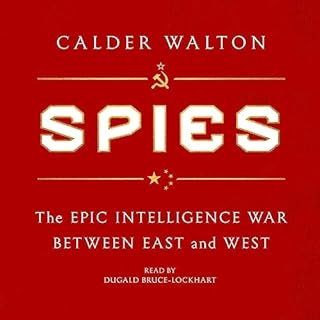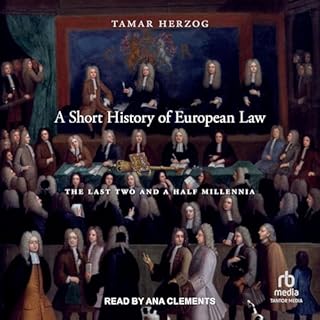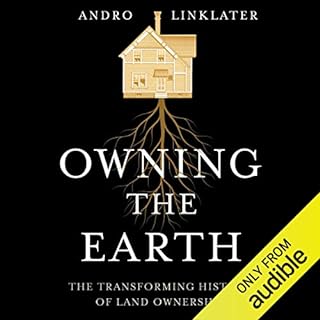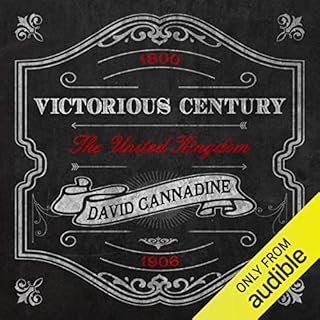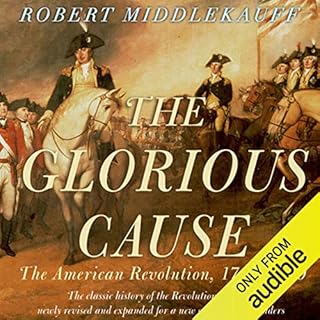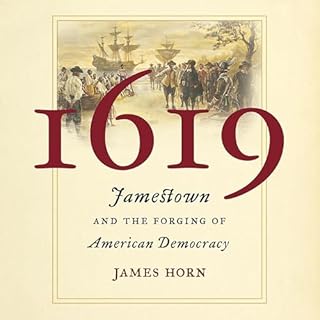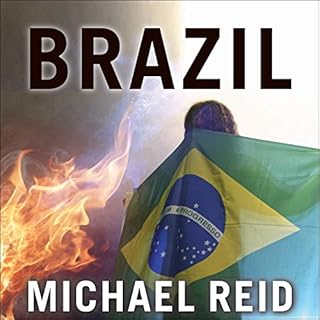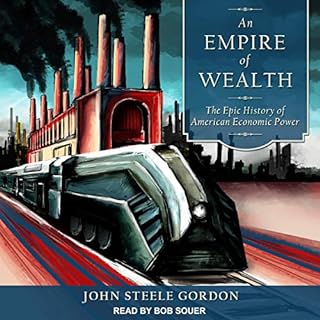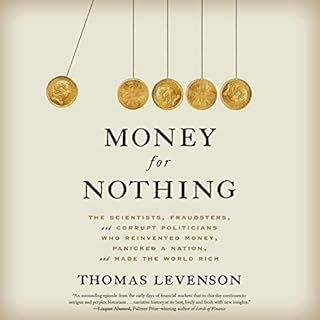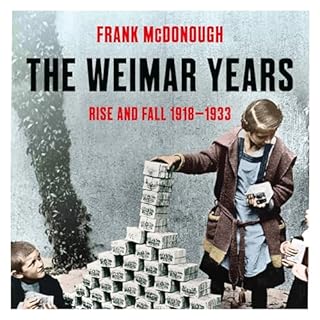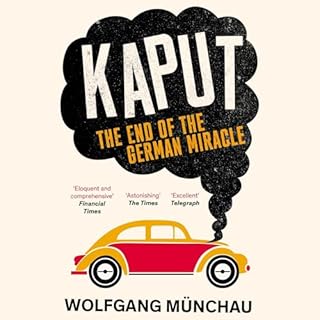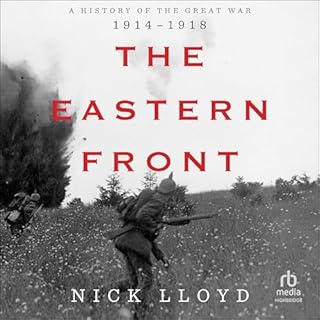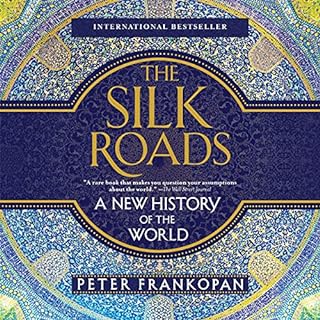
Empire, Incorporated
The Corporations That Built British Colonialism
Failed to add items
Add to Cart failed.
Add to Wish List failed.
Remove from wishlist failed.
Adding to library failed
Follow podcast failed
Unfollow podcast failed
 Prime members: New to Audible?
Prime members: New to Audible?Get 2 free audiobooks during trial.
Buy for $21.49
No default payment method selected.
We are sorry. We are not allowed to sell this product with the selected payment method
-
Narrated by:
-
Rick Adamson
-
By:
-
Philip J. Stern
About this listen
Across four centuries, British colonialism was above all the business of corporations. Corporations conceived, promoted, financed, and governed overseas expansion, making claims over territory and peoples while ensuring that British and colonial society were invested, quite literally, in their ventures. Colonial companies were also relentlessly controversial, frequently in debt, and prone to failure. The corporation was well-suited to overseas expansion not because it was an inevitable juggernaut but because it was an elusive contradiction: public and private; person and society; subordinate and autonomous; centralized and diffuse; immortal and precarious; national and cosmopolitan—a legal fiction with very real power.
Breaking from traditional histories in which corporations take a supporting role by doing the dirty work of sovereign states in exchange for commercial monopolies, Philip Stern argues that corporations took the lead in global expansion and administration. As Empire, Incorporated makes clear, venture colonialism did not cease with the end of empire.
Challenging conventional wisdom about where power is held on a global scale, Stern complicates the supposedly firm distinction between private enterprise and the state, offering a new history of the British Empire, as well as a new history of the corporation.
©2023 The President and Fellows of Harvard College (P)2023 TantorListeners also enjoyed...
-
The Earth Transformed
- An Untold History
- By: Peter Frankopan
- Narrated by: Peter Frankopan
- Length: 29 hrs and 11 mins
- Unabridged
-
Overall4.5 out of 5 stars 49
-
Performance4.5 out of 5 stars 43
-
Story4.5 out of 5 stars 43
Global warming is one of the greatest dangers mankind faces today. Even as temperatures increase, sea levels rise, and natural disasters escalate, our current environmental crisis feels difficult to predict and understand. But climate change and its effects on us are not new. In a bold narrative that spans centuries and continents, Peter Frankopan argues that nature has always played a fundamental role in the writing of history.
-
5 out of 5 stars
-
A Thoughtful History of A Complex Phenomenon
- By Lucy A. Pithecus on 04-21-23
By: Peter Frankopan
-
The Middle Kingdoms
- A New History of Central Europe
- By: Martyn Rady
- Narrated by: John Curless
- Length: 22 hrs and 56 mins
- Unabridged
-
Overall4.5 out of 5 stars 62
-
Performance4.5 out of 5 stars 57
-
Story4.5 out of 5 stars 57
Central Europe has long been infamous as a region beset by war, a place where empires clashed and world wars began. In The Middle Kingdoms, Martyn Rady offers the definitive history of the region, demonstrating that Central Europe has always been more than merely the fault line between West and East. Even as Central European powers warred with their neighbors, the region developed its own cohesive identity and produced tremendous accomplishments in politics, society, and culture.
-
3 out of 5 stars
-
Marred by the errors in the modern section
- By Paul Boothroyd on 10-20-23
By: Martyn Rady
-
The Blazing World
- A New History of Revolutionary England, 1603-1689
- By: Jonathan Healey
- Narrated by: Oliver Hembrough
- Length: 19 hrs and 42 mins
- Unabridged
-
Overall4.5 out of 5 stars 96
-
Performance4.5 out of 5 stars 80
-
Story4.5 out of 5 stars 81
The seventeenth century was a revolutionary age for the English. It started as they suddenly found themselves ruled by a Scotsman, and it ended in the shadow of an invasion by the Dutch. Under James I, England suffered terrorism and witch panics. Under his son Charles, state and society collapsed into civil war, to be followed by an army coup and regicide. For a short time—for the only time in history—England was a republic. There were bitter struggles over faith and Parliament asserted itself like never before. There were no boundaries to politics.
-
5 out of 5 stars
-
Been looking for this book for a long time
- By cmurrell on 07-30-23
By: Jonathan Healey
-
Homer Box Set: Iliad & Odyssey
- By: Homer, W. H. D. Rouse - translator
- Narrated by: Anthony Heald
- Length: 25 hrs and 2 mins
- Unabridged
-
Overall4.5 out of 5 stars 3,019
-
Performance4.5 out of 5 stars 2,731
-
Story4.5 out of 5 stars 2,724
Homer’s Iliad and Odyssey are unquestionably two of the greatest epic masterpieces in Western literature. Though more than 2,700 years old, their stories of brave heroics, capricious gods, and towering human emotions are vividly timeless. The Iliad can justly be called the world’s greatest war epic. The terrible and long-drawn-out siege of Troy remains one of the classic campaigns. The Odyssey chronicles the many trials and adventures Odysseus must pass through on his long journey home from the Trojan wars to his beloved wife.
-
2 out of 5 stars
-
Oddball Translation
- By Joel Jenkins on 05-11-17
By: Homer, and others
-
Revolutionary Spring
- Europe Aflame and the Fight for a New World, 1848-1849
- By: Christopher Clark
- Narrated by: Christopher Clark
- Length: 33 hrs and 26 mins
- Unabridged
-
Overall4.5 out of 5 stars 51
-
Performance4.5 out of 5 stars 44
-
Story4.5 out of 5 stars 44
As history, the uprisings of 1848 have long been overshadowed by the French Revolution of 1789 and the Russian revolutions of the early twentieth century. And yet in 1848 nearly all of Europe was aflame with conflict. Parallel political tumults spread like brush fire across the entire continent, leading to significant changes that continue to shape our world today. These battles for the future were fought with one eye kept squarely on the past. Revolutionary Spring is a new understanding of 1848 that offers chilling parallels to our present moment.
-
2 out of 5 stars
-
Like the revolutions, it got off to a good start
- By Anonymous User on 06-23-23
-
Judgment at Tokyo
- World War II on Trial and the Making of Modern Asia
- By: Gary J. Bass
- Narrated by: Simon Vance
- Length: 31 hrs and 23 mins
- Unabridged
-
Overall4.5 out of 5 stars 108
-
Performance5 out of 5 stars 90
-
Story4.5 out of 5 stars 90
In the weeks after Japan finally surrendered to the Allies to end World War II, the world turned to the question of how to move on from years of carnage and destruction. For Harry Truman, Douglas MacArthur, Chiang Kai-shek, and their fellow victors, the question of justice seemed clear: Japan’s militaristic leaders needed to be tried and punished for the surprise attack at Pearl Harbor; shocking atrocities against civilians in China, the Philippines, and elsewhere; and rampant abuses of prisoners of war in notorious incidents such as the Bataan death march.
-
1 out of 5 stars
-
Biased revisionist history
- By Amazon Customer on 12-31-23
By: Gary J. Bass
-
The Earth Transformed
- An Untold History
- By: Peter Frankopan
- Narrated by: Peter Frankopan
- Length: 29 hrs and 11 mins
- Unabridged
-
Overall4.5 out of 5 stars 49
-
Performance4.5 out of 5 stars 43
-
Story4.5 out of 5 stars 43
Global warming is one of the greatest dangers mankind faces today. Even as temperatures increase, sea levels rise, and natural disasters escalate, our current environmental crisis feels difficult to predict and understand. But climate change and its effects on us are not new. In a bold narrative that spans centuries and continents, Peter Frankopan argues that nature has always played a fundamental role in the writing of history.
-
5 out of 5 stars
-
A Thoughtful History of A Complex Phenomenon
- By Lucy A. Pithecus on 04-21-23
By: Peter Frankopan
-
The Middle Kingdoms
- A New History of Central Europe
- By: Martyn Rady
- Narrated by: John Curless
- Length: 22 hrs and 56 mins
- Unabridged
-
Overall4.5 out of 5 stars 62
-
Performance4.5 out of 5 stars 57
-
Story4.5 out of 5 stars 57
Central Europe has long been infamous as a region beset by war, a place where empires clashed and world wars began. In The Middle Kingdoms, Martyn Rady offers the definitive history of the region, demonstrating that Central Europe has always been more than merely the fault line between West and East. Even as Central European powers warred with their neighbors, the region developed its own cohesive identity and produced tremendous accomplishments in politics, society, and culture.
-
3 out of 5 stars
-
Marred by the errors in the modern section
- By Paul Boothroyd on 10-20-23
By: Martyn Rady
-
The Blazing World
- A New History of Revolutionary England, 1603-1689
- By: Jonathan Healey
- Narrated by: Oliver Hembrough
- Length: 19 hrs and 42 mins
- Unabridged
-
Overall4.5 out of 5 stars 96
-
Performance4.5 out of 5 stars 80
-
Story4.5 out of 5 stars 81
The seventeenth century was a revolutionary age for the English. It started as they suddenly found themselves ruled by a Scotsman, and it ended in the shadow of an invasion by the Dutch. Under James I, England suffered terrorism and witch panics. Under his son Charles, state and society collapsed into civil war, to be followed by an army coup and regicide. For a short time—for the only time in history—England was a republic. There were bitter struggles over faith and Parliament asserted itself like never before. There were no boundaries to politics.
-
5 out of 5 stars
-
Been looking for this book for a long time
- By cmurrell on 07-30-23
By: Jonathan Healey
-
Homer Box Set: Iliad & Odyssey
- By: Homer, W. H. D. Rouse - translator
- Narrated by: Anthony Heald
- Length: 25 hrs and 2 mins
- Unabridged
-
Overall4.5 out of 5 stars 3,019
-
Performance4.5 out of 5 stars 2,731
-
Story4.5 out of 5 stars 2,724
Homer’s Iliad and Odyssey are unquestionably two of the greatest epic masterpieces in Western literature. Though more than 2,700 years old, their stories of brave heroics, capricious gods, and towering human emotions are vividly timeless. The Iliad can justly be called the world’s greatest war epic. The terrible and long-drawn-out siege of Troy remains one of the classic campaigns. The Odyssey chronicles the many trials and adventures Odysseus must pass through on his long journey home from the Trojan wars to his beloved wife.
-
2 out of 5 stars
-
Oddball Translation
- By Joel Jenkins on 05-11-17
By: Homer, and others
-
Revolutionary Spring
- Europe Aflame and the Fight for a New World, 1848-1849
- By: Christopher Clark
- Narrated by: Christopher Clark
- Length: 33 hrs and 26 mins
- Unabridged
-
Overall4.5 out of 5 stars 51
-
Performance4.5 out of 5 stars 44
-
Story4.5 out of 5 stars 44
As history, the uprisings of 1848 have long been overshadowed by the French Revolution of 1789 and the Russian revolutions of the early twentieth century. And yet in 1848 nearly all of Europe was aflame with conflict. Parallel political tumults spread like brush fire across the entire continent, leading to significant changes that continue to shape our world today. These battles for the future were fought with one eye kept squarely on the past. Revolutionary Spring is a new understanding of 1848 that offers chilling parallels to our present moment.
-
2 out of 5 stars
-
Like the revolutions, it got off to a good start
- By Anonymous User on 06-23-23
-
Judgment at Tokyo
- World War II on Trial and the Making of Modern Asia
- By: Gary J. Bass
- Narrated by: Simon Vance
- Length: 31 hrs and 23 mins
- Unabridged
-
Overall4.5 out of 5 stars 108
-
Performance5 out of 5 stars 90
-
Story4.5 out of 5 stars 90
In the weeks after Japan finally surrendered to the Allies to end World War II, the world turned to the question of how to move on from years of carnage and destruction. For Harry Truman, Douglas MacArthur, Chiang Kai-shek, and their fellow victors, the question of justice seemed clear: Japan’s militaristic leaders needed to be tried and punished for the surprise attack at Pearl Harbor; shocking atrocities against civilians in China, the Philippines, and elsewhere; and rampant abuses of prisoners of war in notorious incidents such as the Bataan death march.
-
1 out of 5 stars
-
Biased revisionist history
- By Amazon Customer on 12-31-23
By: Gary J. Bass
-
Taming the Street
- The Old Guard, the New Deal, and FDR's Fight to Regulate American Capitalism
- By: Diana B. Henriques
- Narrated by: Karen Murray
- Length: 16 hrs and 6 mins
- Unabridged
-
Overall4.5 out of 5 stars 4
-
Performance5 out of 5 stars 4
-
Story4 out of 5 stars 4
Taming the Street describes how President Franklin D. Roosevelt battled to regulate Wall Street in the wake of the 1929 stock market crash and the ensuing Great Depression. With deep reporting and vivid storytelling, Diana B. Henriques takes listeners back to a time when America’s financial landscape was a jungle ruled by the titans of vast wealth, largely unrestrained by government. Roosevelt ran for office in 1932 vowing to curb that ruthless capitalism and make the world of finance safer for ordinary savers and investors.
-
4 out of 5 stars
-
Regulation Nation
- By Smalls on 02-10-24
-
The Princes in the Tower
- Solving History's Greatest Cold Case
- By: Philippa Langley
- Narrated by: Philippa Langley
- Length: 16 hrs and 43 mins
- Unabridged
-
Overall4 out of 5 stars 75
-
Performance3 out of 5 stars 66
-
Story4 out of 5 stars 66
Philippa Langley reveals the findings of a remarkable new research initiative: ‘The Missing Princes Project'. In the summer of 1483, Edward V (aged 12) and his brother Richard Duke of York (aged 9), disappeared from the Tower of London. For over 500 years, history has judged that they were murdered on the orders of their uncle Richard III. Following years of intensive research in UK, American and European archives, astonishing new archival discoveries have been uncovered that change what we know about the fate of the Princes in the Tower.
-
4 out of 5 stars
-
Narrator
- By The Rev. Craig on 12-07-23
By: Philippa Langley
-
Conflict
- The Evolution of Warfare from 1945 to Ukraine
- By: David Petraeus, Andrew Roberts
- Narrated by: David Petraeus, Robert Fass
- Length: 18 hrs and 27 mins
- Unabridged
-
Overall4.5 out of 5 stars 196
-
Performance4.5 out of 5 stars 178
-
Story4.5 out of 5 stars 178
Two leading authorities—an acclaimed historian and the outstanding battlefield commander and strategist of our time—collaborate on a landmark examination of war since 1945. Conflict is both a sweeping history of the evolution of warfare up to Putin’s invasion of the Ukraine, and a penetrating analysis of what we must learn from the past—and anticipate in the future—in order to navigate an increasingly perilous world.
-
5 out of 5 stars
-
The Story of My Life
- By Nice guy on 03-06-24
By: David Petraeus, and others
-
Bismarck's War
- The Franco-Prussian War and the Making of Modern Europe
- By: Rachel Chrastil
- Narrated by: Sarah Borges
- Length: 17 hrs and 37 mins
- Unabridged
-
Overall4 out of 5 stars 32
-
Performance4 out of 5 stars 30
-
Story4 out of 5 stars 30
Among the conflicts that convulsed Europe during the nineteenth century, none was more startling and consequential than the Franco-Prussian War of 1870-1871. Deliberately engineered by Prussian chancellor Otto von Bismarck, the war succeeded in shattering French supremacy, deposing Napoleon III, and uniting a new German Empire. But it also produced brutal military innovations and a precarious new imbalance of power that together set the stage for the devastating world wars of the next century. In Bismarck’s War, historian Rachel Chrastil chronicles events on the battlefield in full.
-
1 out of 5 stars
-
It's rare I don't finish a book...
- By Chris Corsini on 09-26-23
By: Rachel Chrastil
-
Germany, 1923
- Hyperinflation, Hitler's Pusch and Democracy in Crisis
- By: Volker Ullrich, Jefferson Chase - translator
- Narrated by: Christopher Douyard
- Length: 12 hrs and 56 mins
- Unabridged
-
Overall4.5 out of 5 stars 12
-
Performance4.5 out of 5 stars 12
-
Story4.5 out of 5 stars 12
The great Austrian writer Stefan Zweig confided in his autobiography: “I have a pretty thorough knowledge of history, but never, to my recollection, has it produced such madness in such gigantic proportions.” He was referring to Germany in 1923, a “year of lunacy,” defined by hyperinflation, violence, a political system on the verge of collapse, the rise of Adolf Hitler and the Nazi Party, and separatist movements threatening to rip apart the German nation. Bestselling author Volker Ullrich presents a riveting chronicle of one of the most difficult years any modern democracy has ever faced.
-
5 out of 5 stars
-
Interesting read about economics
- By molliet on 11-01-23
By: Volker Ullrich, and others
-
Theoderic the Great
- King of Goths, Ruler of Romans
- By: Hans-Ulrich Wiemer, John Noel Dillon - translator
- Narrated by: Julian Elfer
- Length: 23 hrs and 11 mins
- Unabridged
-
Overall4.5 out of 5 stars 30
-
Performance4.5 out of 5 stars 27
-
Story4.5 out of 5 stars 27
In the year 493, the leader of a vast confederation of Gothic warriors, their wives, and children personally cut down Odoacer, the man famous for deposing the last Roman emperor in 476. That leader became Theoderic the Great (454-526). This engaging history of his life and reign immerses listeners in the world of the warrior-king who ushered in decades of peace and stability in Italy as king of Goths and Romans.
-
4 out of 5 stars
-
More for historians than general readers
- By Bill Staley on 10-29-23
By: Hans-Ulrich Wiemer, and others
-
The Burgundians
- A Vanished Empire: A History of 1111 Years and One Day
- By: Bart van Loo, Nancy Forest-Flier - translator
- Narrated by: Nigel Patterson
- Length: 21 hrs and 12 mins
- Unabridged
-
Overall4.5 out of 5 stars 156
-
Performance5 out of 5 stars 132
-
Story4.5 out of 5 stars 132
At the end of the fifteenth century, Burgundy was extinguished as an independent state. It had been a fabulously wealthy, turbulent region situated between France and Germany, with close links to the English kingdom. Torn apart by the dynastic struggles of early modern Europe, this extraordinary realm vanished from the map. But it became the cradle of what we now know as the Low Countries, modern Belgium and the Netherlands. This is the story of a thousand years, a must-listen narrative history of ambitious aristocrats, family dysfunction, treachery, savage battles, luxury, and madness.
-
5 out of 5 stars
-
Extraordinary story, expertly told and skillfully narrated
- By Daniel Vergara on 03-01-24
By: Bart van Loo, and others
-
The Loom of Time
- Between Empire and Anarchy, from the Mediterranean to China
- By: Robert D. Kaplan
- Narrated by: Eric Jason Martin
- Length: 14 hrs and 49 mins
- Unabridged
-
Overall4.5 out of 5 stars 67
-
Performance4.5 out of 5 stars 57
-
Story4.5 out of 5 stars 57
The Greater Middle East—the vast region between the Mediterranean and China, encompassing much of the Arab world, parts of northern Africa, and Asia—existed for millennia as the crossroads of empire. But with the dissolution of empires in the twentieth century, postcolonial states have endeavored to maintain stability. Robert D. Kaplan explores Greater Middle East through reporting and travel writing to reveal deeper truths about the impacts of history on the present and how the requirements of stability over anarchy are often in conflict with the ideals of democratic governance.
-
4 out of 5 stars
-
detailed primer on the greater 'Middle East'
- By Stevon on 02-01-24
By: Robert D. Kaplan
-
Pax
- War and Peace in Rome's Golden Age
- By: Tom Holland
- Narrated by: Tom Holland
- Length: 14 hrs and 53 mins
- Unabridged
-
Overall5 out of 5 stars 214
-
Performance5 out of 5 stars 205
-
Story5 out of 5 stars 205
The Pax Romana has long been shorthand for the empire’s golden age. Stretching from Caledonia to Arabia, Rome ruled over a quarter of the world’s population. It was the wealthiest and most formidable state in the history of humankind. Pax is a captivating narrative history of Rome at the height of its power. From the gilded capital to realms beyond the frontier, historian Tom Holland shows ancient Rome in all its glory
-
5 out of 5 stars
-
Great book!
- By Mic on 09-27-23
By: Tom Holland
-
Spies
- The Epic Intelligence War Between East and West
- By: Calder Walton
- Narrated by: Dugald Bruce-Lockhart
- Length: 20 hrs and 22 mins
- Unabridged
-
Overall4 out of 5 stars 121
-
Performance4.5 out of 5 stars 103
-
Story4.5 out of 5 stars 103
Spies is the history of the secret war that Russia and the West have been waging for a century. Espionage, sabotage, and subversion were the Kremlin’s means to equalize the imbalance of resources between the East and West before, during, and after the Cold War. There was nothing “unprecedented” about Russian meddling in the 2016 US presidential election. It was simply business as usual, new means used for old ends.
-
3 out of 5 stars
-
A detailed history, inexcusably marred by politics
- By Thomas Randolph on 08-12-23
By: Calder Walton
-
A Short History of European Law
- The Last Two and a Half Millennia
- By: Tamar Herzog
- Narrated by: Ana Clements
- Length: 10 hrs and 34 mins
- Unabridged
-
Overall4.5 out of 5 stars 3
-
Performance4.5 out of 5 stars 3
-
Story4.5 out of 5 stars 3
A Short History of European Law brings to life 2,500 years of legal history, tying current norms to the circumstances of their conception. Tamar Herzog describes how successive legal systems built upon one another, from ancient times through the European Union. Roman law formed the backbone of each configuration, though the way it was used and reshaped varied dramatically from one century and place to the next. Only by considering Continental civil law and English common law together do we see how they drew from and enriched this shared tradition.
By: Tamar Herzog
-
Empires of the Steppes
- By: Kenneth Harl
- Narrated by: Corey M. Snow
- Length: 17 hrs and 13 mins
- Unabridged
-
Overall4.5 out of 5 stars 130
-
Performance4.5 out of 5 stars 112
-
Story4.5 out of 5 stars 112
The barbarian nomads of the Eurasian steppes have played a decisive role in world history, but their achievements have gone largely unnoticed. These nomadic tribes have produced some of the world’s greatest conquerors: Attila the Hun, Genghis Khan and Tamerlane, among others. Their deeds still resonate today. Indeed, these nomads built long-lasting empires, facilitated the first global trade of the Silk Road and disseminated religions, technology, knowledge and goods of every description that enriched and changed the lives of so many across Europe, China and the Middle East.
-
5 out of 5 stars
-
Interview with Dan Carlin
- By Laurie A. Steuart on 08-17-23
By: Kenneth Harl
Related to this topic
-
The Corporation That Changed the World
- How the East India Company Shaped the Modern Multinational
- By: Nick Robins
- Narrated by: Simon Barber
- Length: 11 hrs and 49 mins
- Unabridged
-
Overall4 out of 5 stars 97
-
Performance4 out of 5 stars 86
-
Story4 out of 5 stars 85
The English East India Company was the mother of the modern multinational. Its trading empire encircled the globe, importing Asian luxuries such as spices, textiles, and teas. But it also conquered much of India with its private army and broke open China's markets with opium. The Company's practices shocked its contemporaries and still reverberate today.
-
1 out of 5 stars
-
Not what I expect from a history book
- By Bobby on 10-09-18
By: Nick Robins
-
Inside Money
- Brown Brothers Harriman and the American Way of Power
- By: Zachary Karabell
- Narrated by: Zachary Karabell
- Length: 17 hrs and 16 mins
- Unabridged
-
Overall4.5 out of 5 stars 161
-
Performance4.5 out of 5 stars 140
-
Story4.5 out of 5 stars 140
In Inside Money, acclaimed historian, commentator, and former financial executive Zachary Karabell offers the first full and frank look inside this institution against the backdrop of American history. Blessed with complete access to the company's archives, as well as a thrilling understanding of the larger forces at play, Karabell has created an X-ray of American power - financial, political, cultural - as it has evolved from the early 1800s to the present.
-
5 out of 5 stars
-
Brilliant, well researched & highly insightful
- By Mongezi on 02-11-22
By: Zachary Karabell
-
Owning the Earth
- The Transforming History of Land Ownership
- By: Andro Linklater
- Narrated by: J. Paul Guimont
- Length: 17 hrs and 9 mins
- Unabridged
-
Overall4.5 out of 5 stars 38
-
Performance4.5 out of 5 stars 29
-
Story4.5 out of 5 stars 30
The history and evolution of land ownership is a fascinating chronicle in the history of civilization, offering unexpected insights about how various forms of democracy and capitalism developed, as well as a revealing analysis of a future where the Earth must sustain nine billion lives. Seen through the eyes of remarkable individuals - Chinese emperors; German peasants; the 17th century English surveyor William Petty, who first saw the connection between private property and free-market capitalism.
-
5 out of 5 stars
-
Interesting
- By S. Olsen on 06-30-15
By: Andro Linklater
-
The Price of Greatness
- By: Jay Cost
- Narrated by: Dan Woren
- Length: 8 hrs and 10 mins
- Unabridged
-
Overall4.5 out of 5 stars 56
-
Performance4.5 out of 5 stars 48
-
Story4.5 out of 5 stars 47
In the history of American politics, there are few stories as enigmatic as that of Alexander Hamilton and James Madison's bitterly personal falling out. Together they helped bring the Constitution into being, yet soon after the new republic was born, they broke over the meaning of its founding document. Hamilton emphasized economic growth; Madison the importance of republican principles. Author Jay Cost is the first to argue that both men were right - and that their quarrel reveals a fundamental paradox at the heart of the American experiment.
-
5 out of 5 stars
-
Principles in Tension
- By William Ehrich on 06-13-18
By: Jay Cost
-
Blood and Money
- War, Slavery, Finance, and Empire
- By: David McNally
- Narrated by: Tim Getman
- Length: 11 hrs and 59 mins
- Unabridged
-
Overall4.5 out of 5 stars 37
-
Performance4.5 out of 5 stars 36
-
Story4.5 out of 5 stars 36
In most accounts of the origins of money, we are offered pleasant tales in which it arises to the mutual benefit of all parties as a result of barter. In this groundbreaking study David McNally reveals the true story of money's origins and development as one of violence and human bondage. Money's emergence and its transformation are shown to be intimately connected to the buying and selling of slaves and the waging of war.
-
4 out of 5 stars
-
Blood Money
- By Tyrone on 03-19-22
By: David McNally
-
The Company
- A Short History of a Revolutionary Idea [Modern Library Chronicles]
- By: John Micklethwait, Adrian Wooldridge
- Narrated by: Jonathan Davis
- Length: 6 hrs and 46 mins
- Unabridged
-
Overall3.5 out of 5 stars 149
-
Performance4 out of 5 stars 72
-
Story4 out of 5 stars 69
In The Company, the largely unknown history of the joint-stock company is presented by the editors of Economist. One of history's greatest catalysts, the joint-stock company has dramatically changed the way human beings live, work, and conduct business. With companies now affecting the world on a global scale, it is more pressing than ever before to understand this driving force.
-
4 out of 5 stars
-
unique history with a unique perspective
- By D. Littman on 10-31-05
By: John Micklethwait, and others
-
The Corporation That Changed the World
- How the East India Company Shaped the Modern Multinational
- By: Nick Robins
- Narrated by: Simon Barber
- Length: 11 hrs and 49 mins
- Unabridged
-
Overall4 out of 5 stars 97
-
Performance4 out of 5 stars 86
-
Story4 out of 5 stars 85
The English East India Company was the mother of the modern multinational. Its trading empire encircled the globe, importing Asian luxuries such as spices, textiles, and teas. But it also conquered much of India with its private army and broke open China's markets with opium. The Company's practices shocked its contemporaries and still reverberate today.
-
1 out of 5 stars
-
Not what I expect from a history book
- By Bobby on 10-09-18
By: Nick Robins
-
Inside Money
- Brown Brothers Harriman and the American Way of Power
- By: Zachary Karabell
- Narrated by: Zachary Karabell
- Length: 17 hrs and 16 mins
- Unabridged
-
Overall4.5 out of 5 stars 161
-
Performance4.5 out of 5 stars 140
-
Story4.5 out of 5 stars 140
In Inside Money, acclaimed historian, commentator, and former financial executive Zachary Karabell offers the first full and frank look inside this institution against the backdrop of American history. Blessed with complete access to the company's archives, as well as a thrilling understanding of the larger forces at play, Karabell has created an X-ray of American power - financial, political, cultural - as it has evolved from the early 1800s to the present.
-
5 out of 5 stars
-
Brilliant, well researched & highly insightful
- By Mongezi on 02-11-22
By: Zachary Karabell
-
Owning the Earth
- The Transforming History of Land Ownership
- By: Andro Linklater
- Narrated by: J. Paul Guimont
- Length: 17 hrs and 9 mins
- Unabridged
-
Overall4.5 out of 5 stars 38
-
Performance4.5 out of 5 stars 29
-
Story4.5 out of 5 stars 30
The history and evolution of land ownership is a fascinating chronicle in the history of civilization, offering unexpected insights about how various forms of democracy and capitalism developed, as well as a revealing analysis of a future where the Earth must sustain nine billion lives. Seen through the eyes of remarkable individuals - Chinese emperors; German peasants; the 17th century English surveyor William Petty, who first saw the connection between private property and free-market capitalism.
-
5 out of 5 stars
-
Interesting
- By S. Olsen on 06-30-15
By: Andro Linklater
-
The Price of Greatness
- By: Jay Cost
- Narrated by: Dan Woren
- Length: 8 hrs and 10 mins
- Unabridged
-
Overall4.5 out of 5 stars 56
-
Performance4.5 out of 5 stars 48
-
Story4.5 out of 5 stars 47
In the history of American politics, there are few stories as enigmatic as that of Alexander Hamilton and James Madison's bitterly personal falling out. Together they helped bring the Constitution into being, yet soon after the new republic was born, they broke over the meaning of its founding document. Hamilton emphasized economic growth; Madison the importance of republican principles. Author Jay Cost is the first to argue that both men were right - and that their quarrel reveals a fundamental paradox at the heart of the American experiment.
-
5 out of 5 stars
-
Principles in Tension
- By William Ehrich on 06-13-18
By: Jay Cost
-
Blood and Money
- War, Slavery, Finance, and Empire
- By: David McNally
- Narrated by: Tim Getman
- Length: 11 hrs and 59 mins
- Unabridged
-
Overall4.5 out of 5 stars 37
-
Performance4.5 out of 5 stars 36
-
Story4.5 out of 5 stars 36
In most accounts of the origins of money, we are offered pleasant tales in which it arises to the mutual benefit of all parties as a result of barter. In this groundbreaking study David McNally reveals the true story of money's origins and development as one of violence and human bondage. Money's emergence and its transformation are shown to be intimately connected to the buying and selling of slaves and the waging of war.
-
4 out of 5 stars
-
Blood Money
- By Tyrone on 03-19-22
By: David McNally
-
The Company
- A Short History of a Revolutionary Idea [Modern Library Chronicles]
- By: John Micklethwait, Adrian Wooldridge
- Narrated by: Jonathan Davis
- Length: 6 hrs and 46 mins
- Unabridged
-
Overall3.5 out of 5 stars 149
-
Performance4 out of 5 stars 72
-
Story4 out of 5 stars 69
In The Company, the largely unknown history of the joint-stock company is presented by the editors of Economist. One of history's greatest catalysts, the joint-stock company has dramatically changed the way human beings live, work, and conduct business. With companies now affecting the world on a global scale, it is more pressing than ever before to understand this driving force.
-
4 out of 5 stars
-
unique history with a unique perspective
- By D. Littman on 10-31-05
By: John Micklethwait, and others
-
Victorious Century
- The United Kingdom, 1800-1906
- By: David Cannadine
- Narrated by: Kris Dyer
- Length: 24 hrs and 57 mins
- Unabridged
-
Overall4.5 out of 5 stars 60
-
Performance4.5 out of 5 stars 51
-
Story4.5 out of 5 stars 52
To live in 19th-century Britain was to experience an astonishing series of changes, of a kind for which there was simply no precedent. There were revolutions in transport, communication and work; cities grew vast; and scientific ideas made the intellectual landscape unrecognisable. This was an exhilarating time but also a horrifying one. In his new book, David Cannadine has created a bold, fascinating new interpretation of the British 19th century in all its energy and dynamism, darkness and vice.
-
3 out of 5 stars
-
Blandly toeing the line between macro and micro
- By Max Shafer-landau on 10-17-17
By: David Cannadine
-
The Glorious Cause: The American Revolution: 1763-1789
- By: Robert Middlekauff
- Narrated by: Robert Fass
- Length: 26 hrs and 56 mins
- Unabridged
-
Overall4.5 out of 5 stars 1,305
-
Performance4.5 out of 5 stars 1,106
-
Story4.5 out of 5 stars 1,101
The first book to appear in the illustrious Oxford History of the United States, this critically-acclaimed volume - a finalist for the Pulitzer Prize - offers an unsurpassed history of the Revolutionary War and the birth of the American republic.
-
4 out of 5 stars
-
Strong History Rich With Behind The Scenes Details
- By John on 10-06-11
-
Slavery's Capitalism
- A New History of American Economic Development
- By: Sven Beckert - editor, Seth Rockman - editor
- Narrated by: William Hughes, Kevin Kenerly, Bahni Turpin, and others
- Length: 13 hrs and 49 mins
- Unabridged
-
Overall4.5 out of 5 stars 432
-
Performance4.5 out of 5 stars 367
-
Story4.5 out of 5 stars 367
During the 19th century, the United States entered the ranks of the world's most advanced and dynamic economies. At the same time, the nation sustained an expansive and brutal system of human bondage. This was no mere coincidence. Slavery's Capitalism argues for slavery's centrality to the emergence of American capitalism in the decades between the Revolution and the Civil War.
-
1 out of 5 stars
-
The volume is so low I can't hear it.
- By Anonymous User on 01-30-18
By: Sven Beckert - editor, and others
-
America's First Great Depression
- Economic Crisis and Political Disorder After the Panic of 1837
- By: Alasdair Roberts
- Narrated by: Kevin Young
- Length: 10 hrs and 42 mins
- Unabridged
-
Overall4 out of 5 stars 46
-
Performance4.5 out of 5 stars 39
-
Story4 out of 5 stars 39
For a while, it seemed impossible to lose money on real estate. But then the bubble burst. The financial sector was paralyzed and the economy contracted. State and federal governments struggled to pay their domestic and foreign creditors. Washington was incapable of decisive action. The country seethed with political and social unrest. In America's First Great Depression, Alasdair Roberts describes how the United States dealt with the economic and political crisis that followed the Panic of 1837.
-
5 out of 5 stars
-
Excellent Story
- By Timothy on 06-10-13
By: Alasdair Roberts
-
James Madison
- America's First Politician
- By: Jay Cost
- Narrated by: Dan Woren
- Length: 14 hrs and 43 mins
- Unabridged
-
Overall4.5 out of 5 stars 110
-
Performance5 out of 5 stars 92
-
Story4.5 out of 5 stars 92
How do you solve a problem like James Madison? The fourth president is one of the most confounding figures in early American history; his political trajectory seems almost intentionally inconsistent. He was both for and against a strong federal government. He wrote about the dangers of political parties in the Federalist Papers and then helped to found the Republican Party just a few years later. This so-called Madison problem has occupied scholars for ages.
-
5 out of 5 stars
-
Good listen
- By James Shannon on 06-27-22
By: Jay Cost
-
1619
- Jamestown and the Forging of American Democracy
- By: James Horn
- Narrated by: Dan Woren
- Length: 6 hrs and 47 mins
- Unabridged
-
Overall4.5 out of 5 stars 162
-
Performance4.5 out of 5 stars 126
-
Story4.5 out of 5 stars 126
Along the banks of the James River, Virginia, during an oppressively hot spell in the middle of summer 1619, two events occurred within a few weeks of each other that would profoundly shape the course of history. In the newly built church at Jamestown, the General Assembly - the first gathering of a representative governing body in America - came together. A few weeks later, a battered privateer entered the Chesapeake Bay carrying the first African slaves to land on mainland English America.
-
5 out of 5 stars
-
Brilliant!
- By HonestOpin on 05-06-19
By: James Horn
-
The Unfinished Symphony
- The Clash of the Two Americas, Volume 1
- By: Matthew Ehret, Cynthia Chung
- Narrated by: Hugh Trudeau
- Length: 5 hrs and 55 mins
- Unabridged
-
Overall4.5 out of 5 stars 29
-
Performance4.5 out of 5 stars 25
-
Story5 out of 5 stars 26
This volume will showcase the international grand design led by Benjamin Franklin that manifested in the establishment of the American republic and trace the next 130 years of world history as the USA was targeted for destruction by oligarchical forces from London and also from within leading up to the assassination of William McKinley in 1901.
-
5 out of 5 stars
-
dynamite content and research
- By john garda on 12-11-24
By: Matthew Ehret, and others
-
Brazil
- The Troubled Rise of a Global Power
- By: Michael Reid
- Narrated by: Michael Healy
- Length: 16 hrs and 38 mins
- Unabridged
-
Overall4.5 out of 5 stars 65
-
Performance4 out of 5 stars 61
-
Story4 out of 5 stars 61
Experts believe that Brazil, the world's fifth largest country and its seventh largest economy, will be one of the most important global powers by the year 2030. Yet far more attention has been paid to the other rising behemoths: Russia, India, and China. Often ignored and underappreciated, Brazil, according to renowned, award-winning journalist Michael Reid, has finally begun to live up to its potential but faces important challenges before it becomes a nation of substantial global significance.
-
5 out of 5 stars
-
Good short history of Brazil, lame pronunciation
- By Bubu Mungani on 07-21-19
By: Michael Reid
-
The World Turned Upside Down
- America, China, and the Struggle for Global Leadership
- By: Clyde Prestowitz
- Narrated by: Paul Heitsch
- Length: 13 hrs and 24 mins
- Unabridged
-
Overall4.5 out of 5 stars 40
-
Performance4.5 out of 5 stars 34
-
Story4.5 out of 5 stars 34
When China joined the World Trade Organization in 2001, most experts expected the WTO rules and procedures would liberalize China and make it "a responsible stakeholder in the liberal world order". But the experts made the wrong bet. China today is liberalizing neither economically nor politically but, if anything, becoming more authoritarian and mercantilist. In this book, renowned globalization and Asia expert Clyde Prestowitz describes the key challenges posed by China and the strategies America and the Free World must adopt to meet them.
-
5 out of 5 stars
-
Informative and engaging
- By Christopher P Pratt on 02-28-21
By: Clyde Prestowitz
-
American Heritage History of the United States
- By: Douglas Brinkley
- Narrated by: Eric Martin
- Length: 23 hrs and 13 mins
- Unabridged
-
Overall4.5 out of 5 stars 54
-
Performance4.5 out of 5 stars 42
-
Story5 out of 5 stars 42
Douglas Brinkley takes us on the incredible journey of the United States - a nation formed from a vast countryside on whose fringes 13 small British colonies fought for their freedom, then established a democratic nation that spanned the continent and went on to become a world power. This book will be treasured by anyone interested in the story of America.
-
5 out of 5 stars
-
Highly recommended!
- By M. Hu on 08-04-17
By: Douglas Brinkley
-
An Empire of Wealth
- The Epic History of American Economic Power
- By: John Steele Gordon
- Narrated by: Bob Souer
- Length: 14 hrs and 24 mins
- Unabridged
-
Overall4.5 out of 5 stars 73
-
Performance5 out of 5 stars 62
-
Story5 out of 5 stars 62
Throughout time, from ancient Rome to modern Britain, the great empires built and maintained their domination through force of arms and political power. But not the United States. America has dominated the world in a new, peaceful, and pervasive way - through the continued creation of staggering wealth. In this authoritative, engrossing history, John Steele Gordon captures as never before the true source of our nation's global influence: wealth and the capacity to create more of it.
-
5 out of 5 stars
-
KNOW YOUR HISTORY!
- By CP Guy on 12-22-20
-
Money for Nothing
- The Scientists, Fraudsters, and Corrupt Politicians Who Reinvented Money, Panicked a Nation, and Made the World Rich
- By: Thomas Levenson
- Narrated by: Dan Bittner
- Length: 12 hrs and 12 mins
- Unabridged
-
Overall4.5 out of 5 stars 97
-
Performance4.5 out of 5 stars 80
-
Story4.5 out of 5 stars 80
In the heart of the Scientific Revolution, when new theories promised to explain the affairs of the universe, Britain was broke, facing a mountain of debt accumulated in war after war it could not afford. But that same Scientific Revolution - the kind of thinking that helped Isaac Newton solve the mysteries of the cosmos - would soon lead clever, if not always scrupulous, men to try to figure a way out of Britain’s financial troubles.
-
5 out of 5 stars
-
Financial innovation's first song of the siren.
- By Michael Barnett on 09-06-20
By: Thomas Levenson
People who viewed this also viewed...
-
Everyone Has a Story
- By: Savi Sharma
- Narrated by: Smita Singh, Shriram Iyer
- Length: 3 hrs and 10 mins
- Unabridged
-
Overall3.5 out of 5 stars 11
-
Performance3.5 out of 5 stars 8
-
Story3.5 out of 5 stars 9
Everyone has a story. Pull up a chair in Kafe Kabir and listen to four people explore friendship and love, writing their own pages of life from the cosy café to the ends of the world.
-
1 out of 5 stars
-
No no no no no
- By Panda on 10-08-19
By: Savi Sharma
-
The Weimar Years
- Rise and Fall 1918–1933
- By: Frank McDonough
- Narrated by: Paul McGann
- Length: 19 hrs and 24 mins
- Unabridged
-
Overall5 out of 5 stars 29
-
Performance5 out of 5 stars 25
-
Story5 out of 5 stars 25
Established in 1918–19, in the wake of Germany’s catastrophic defeat in the First World War and the revolution that followed swiftly on its heels, the Weimar Republic ushered in widespread social reform, a radical cultural flowering and the most democratic conditions the German people had ever known. The Weimar Years is a vivid narrative of a dramatic period in German history. Year by year, from 1918 to 1933, Frank McDonough covers the major events in both domestic and foreign policy and the personalities who shaped them, together with developments in music, art, theatre and literature.
-
5 out of 5 stars
-
An excellent history of the time period
- By Jackie Renee Johnson on 04-02-24
By: Frank McDonough
-
Spice
- The 16th-Century Contest That Shaped the Modern World
- By: Roger Crowley
- Narrated by: Samuel Roukin
- Length: 8 hrs and 57 mins
- Unabridged
-
Overall4.5 out of 5 stars 32
-
Performance4.5 out of 5 stars 28
-
Story4.5 out of 5 stars 28
Spices drove the early modern world economy, and for Europeans they represented riches on an unprecedented scale. Cloves and nutmeg could reach Europe only via a complex web of trade routes, and for decades Spanish and Portuguese explorers competed to find their elusive source. But when the Portuguese finally reached the spice islands of the Moluccas in 1511, they set in motion a fierce competition for control.
-
3 out of 5 stars
-
Spice or Megellan?
- By BarbieAlaska on 06-21-24
By: Roger Crowley
-
Kaput
- The End of the German Miracle
- By: Wolfgang Münchau
- Narrated by: Mark Elstob
- Length: 6 hrs and 19 mins
- Unabridged
-
Overall4 out of 5 stars 17
-
Performance4 out of 5 stars 17
-
Story4 out of 5 stars 17
In Kaput, Wolfgang Münchau argues that the weaknesses of Germany's economy have, in fact, been brewing for decades. The neo-mercantilist policies of the German state, driven by close connections between the country's industrial and political elite, have left Germany technologically behind over-reliant on authoritarian Russia and China—and with little sign of being able to adapt to the digital realities of the 21st century. It is an essential read for anyone interested in the future of Europe's biggest economy.
-
3 out of 5 stars
-
economicaly sound but geopoliticaly weak
- By Anonymous User on 01-19-25
By: Wolfgang Münchau
-
The Eastern Front
- A History of the Great War 1914-1918
- By: Nick Lloyd
- Narrated by: Elliot Fitzpatrick
- Length: 22 hrs and 43 mins
- Unabridged
-
Overall5 out of 5 stars 8
-
Performance4.5 out of 5 stars 8
-
Story5 out of 5 stars 8
Drawing on the latest scholarship as well as eyewitness reports, diary entries, and memoirs, Lloyd moves from the great battles of 1914 to the final collapse of the Central Powers in 1918, showing how a local struggle between Austria-Hungary and Serbia spiraled into a massive conflagration that pulled in Germany, Russia, Italy, Romania, and Bulgaria.
-
5 out of 5 stars
-
The sense of tragic inevitabilities and complexities of the entire conflict is made painfully clear
- By Johannes Rojahn on 01-05-25
By: Nick Lloyd
-
The Silk Roads
- A New History of the World
- By: Peter Frankopan
- Narrated by: Laurence Kennedy
- Length: 24 hrs and 4 mins
- Unabridged
-
Overall4.5 out of 5 stars 584
-
Performance4.5 out of 5 stars 508
-
Story4.5 out of 5 stars 506
It was on the Silk Roads that East and West first encountered each other through trade and conquest, leading to the spread of ideas, cultures, and religions. From the rise and fall of empires to the spread of Buddhism and the advent of Christianity and Islam, right up to the great wars of the 20th century - this book shows how the fate of the West has always been inextricably linked to the East.
-
5 out of 5 stars
-
An Absolutely SUPERB Book for Lovers of History
- By Dipam on 06-27-21
By: Peter Frankopan
-
Everyone Has a Story
- By: Savi Sharma
- Narrated by: Smita Singh, Shriram Iyer
- Length: 3 hrs and 10 mins
- Unabridged
-
Overall3.5 out of 5 stars 11
-
Performance3.5 out of 5 stars 8
-
Story3.5 out of 5 stars 9
Everyone has a story. Pull up a chair in Kafe Kabir and listen to four people explore friendship and love, writing their own pages of life from the cosy café to the ends of the world.
-
1 out of 5 stars
-
No no no no no
- By Panda on 10-08-19
By: Savi Sharma
-
The Weimar Years
- Rise and Fall 1918–1933
- By: Frank McDonough
- Narrated by: Paul McGann
- Length: 19 hrs and 24 mins
- Unabridged
-
Overall5 out of 5 stars 29
-
Performance5 out of 5 stars 25
-
Story5 out of 5 stars 25
Established in 1918–19, in the wake of Germany’s catastrophic defeat in the First World War and the revolution that followed swiftly on its heels, the Weimar Republic ushered in widespread social reform, a radical cultural flowering and the most democratic conditions the German people had ever known. The Weimar Years is a vivid narrative of a dramatic period in German history. Year by year, from 1918 to 1933, Frank McDonough covers the major events in both domestic and foreign policy and the personalities who shaped them, together with developments in music, art, theatre and literature.
-
5 out of 5 stars
-
An excellent history of the time period
- By Jackie Renee Johnson on 04-02-24
By: Frank McDonough
-
Spice
- The 16th-Century Contest That Shaped the Modern World
- By: Roger Crowley
- Narrated by: Samuel Roukin
- Length: 8 hrs and 57 mins
- Unabridged
-
Overall4.5 out of 5 stars 32
-
Performance4.5 out of 5 stars 28
-
Story4.5 out of 5 stars 28
Spices drove the early modern world economy, and for Europeans they represented riches on an unprecedented scale. Cloves and nutmeg could reach Europe only via a complex web of trade routes, and for decades Spanish and Portuguese explorers competed to find their elusive source. But when the Portuguese finally reached the spice islands of the Moluccas in 1511, they set in motion a fierce competition for control.
-
3 out of 5 stars
-
Spice or Megellan?
- By BarbieAlaska on 06-21-24
By: Roger Crowley
-
Kaput
- The End of the German Miracle
- By: Wolfgang Münchau
- Narrated by: Mark Elstob
- Length: 6 hrs and 19 mins
- Unabridged
-
Overall4 out of 5 stars 17
-
Performance4 out of 5 stars 17
-
Story4 out of 5 stars 17
In Kaput, Wolfgang Münchau argues that the weaknesses of Germany's economy have, in fact, been brewing for decades. The neo-mercantilist policies of the German state, driven by close connections between the country's industrial and political elite, have left Germany technologically behind over-reliant on authoritarian Russia and China—and with little sign of being able to adapt to the digital realities of the 21st century. It is an essential read for anyone interested in the future of Europe's biggest economy.
-
3 out of 5 stars
-
economicaly sound but geopoliticaly weak
- By Anonymous User on 01-19-25
By: Wolfgang Münchau
-
The Eastern Front
- A History of the Great War 1914-1918
- By: Nick Lloyd
- Narrated by: Elliot Fitzpatrick
- Length: 22 hrs and 43 mins
- Unabridged
-
Overall5 out of 5 stars 8
-
Performance4.5 out of 5 stars 8
-
Story5 out of 5 stars 8
Drawing on the latest scholarship as well as eyewitness reports, diary entries, and memoirs, Lloyd moves from the great battles of 1914 to the final collapse of the Central Powers in 1918, showing how a local struggle between Austria-Hungary and Serbia spiraled into a massive conflagration that pulled in Germany, Russia, Italy, Romania, and Bulgaria.
-
5 out of 5 stars
-
The sense of tragic inevitabilities and complexities of the entire conflict is made painfully clear
- By Johannes Rojahn on 01-05-25
By: Nick Lloyd
-
The Silk Roads
- A New History of the World
- By: Peter Frankopan
- Narrated by: Laurence Kennedy
- Length: 24 hrs and 4 mins
- Unabridged
-
Overall4.5 out of 5 stars 584
-
Performance4.5 out of 5 stars 508
-
Story4.5 out of 5 stars 506
It was on the Silk Roads that East and West first encountered each other through trade and conquest, leading to the spread of ideas, cultures, and religions. From the rise and fall of empires to the spread of Buddhism and the advent of Christianity and Islam, right up to the great wars of the 20th century - this book shows how the fate of the West has always been inextricably linked to the East.
-
5 out of 5 stars
-
An Absolutely SUPERB Book for Lovers of History
- By Dipam on 06-27-21
By: Peter Frankopan
What listeners say about Empire, Incorporated
Average customer ratingsReviews - Please select the tabs below to change the source of reviews.
-
Overall5 out of 5 stars
-
Performance5 out of 5 stars
-
Story5 out of 5 stars
- Stephen Tuuk
- 11-12-23
Great read on public / private empire building.
I enjoyed reading the many variations of public and private empire building structures. The different types of “joint stock” arrangements and are well described in this book. We can talk endlessly about the morality and propriety of the British colonial effort, but this book provided insight on how it was done.
Something went wrong. Please try again in a few minutes.
You voted on this review!
You reported this review!
-
Overall1 out of 5 stars
-
Performance1 out of 5 stars
-
Story1 out of 5 stars
- Vivek Oberoi
- 10-23-24
Dry, boring, uninteresting
Just a terrible book. Just endless repetition of the minutiae of British company code. There is a great story to be told about the companies of the British Empire. Jardine Matheson, Imperial Chemical, HSBC, Unilever and hundreds more. Those stories are not told.
Something went wrong. Please try again in a few minutes.
You voted on this review!
You reported this review!





